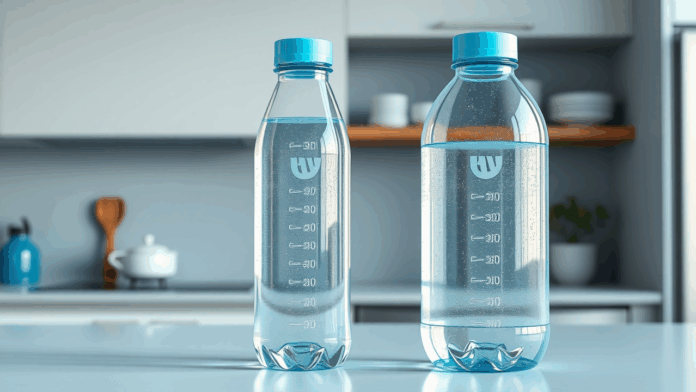Have you ever stopped to wonder whether your glass or plastic hydrogen water bottle could affect your health as much as the water you drink? Surprising as it seems, the material you choose is more than a matter of style or convenience—it could change the entire hydrogen water experience. In this in-depth comparison, I’ll reveal the real differences between glass and plastic hydrogen water bottles, and help you make the safest, smartest choice for your daily hydration.
Unveiling the Debate: Why Choose between Glass vs Plastic Hydrogen Water Bottles?
When it comes to the glass vs plastic hydrogen water bottle debate, choosing the right bottle isn’t just about aesthetics or convenience—it’s about protecting your health, maximizing hydrogen retention, and aligning with your environmental values. As hydrogen water bottles grow in popularity for their potential health benefits and antioxidant effects, discerning users want to know whether glass or plastic is the better vessel. Each option offers pros and cons, impacting everything from hydrogen concentration and taste to portability and chemical safety.
Many consumers assume that all water bottles deliver the benefits of hydrogen water equally. However, the material of your bottle can directly influence how much molecular hydrogen remains in your water, whether harmful chemicals leach into your drink, and how fresh or “clean” your taste experience is. By understanding these material differences, you can make a truly informed decision—and potentially unlock the full power of hydrogen-infused hydration.
“Your hydration vessel plays a bigger role in your health than most people realize—especially when it comes to hydrogen water.”
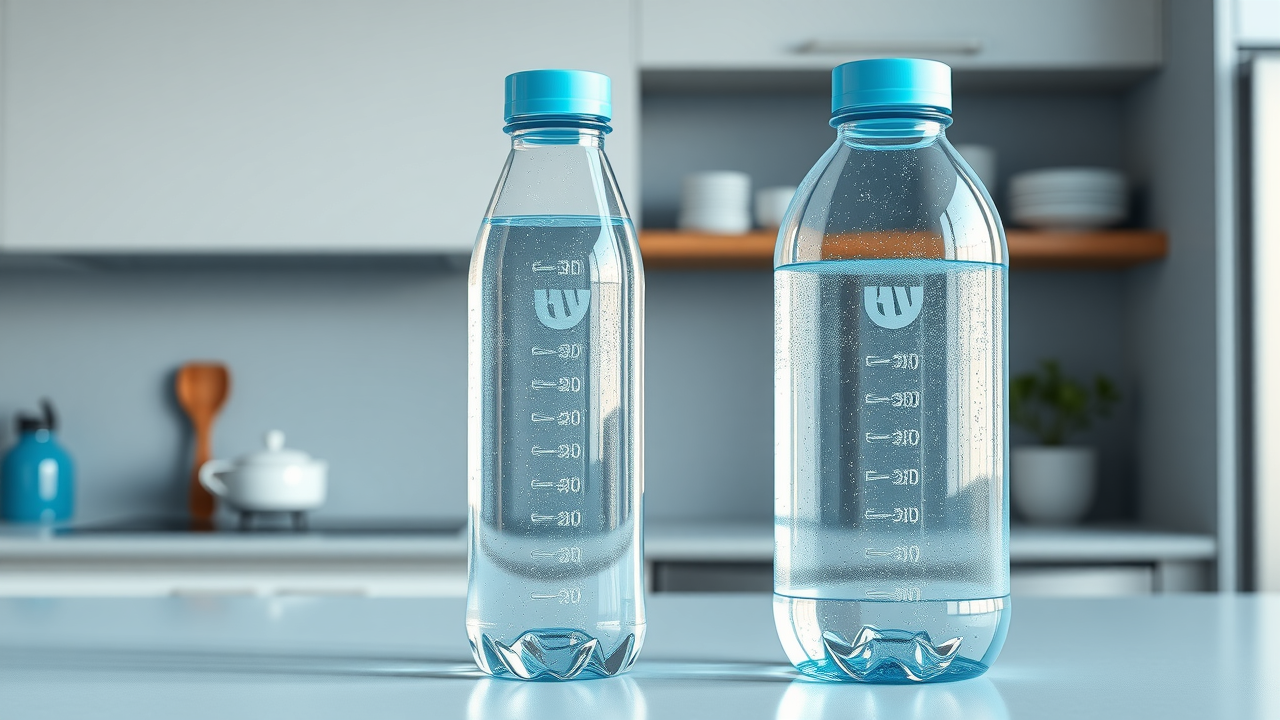
What You’ll Learn About Glass vs Plastic Hydrogen Water Bottle Choices
The pros and cons of glass hydrogen water bottles vs plastic alternatives
Safety, health, and environmental differences for hydrogen water users
Key features and performance related to hydrogen concentration and infusion
What leading experts say about hydrogen water bottle materials
Understanding Hydrogen Water: Basics and Benefits
What Is Hydrogen Water and How Does It Work in Your Water Bottle?
Hydrogen water isn’t just a wellness trend; it’s regular drinking water infused with extra molecular hydrogen (H2) gas—a process that’s typically aided by a hydrogen water bottle. These specially designed bottles use an internal electrolytic plate or filter to generate and dissolve hydrogen gas directly into the water you drink. Unlike glass and plastic bottles used for standard water, hydrogen water bottles are engineered to produce and retain high concentrations of hydrogen, which research suggests can act as a powerful antioxidant. Proponents believe drinking hydrogen-rich water may help reduce oxidative stress, boost recovery, and promote overall wellness. However, the efficacy of these benefits depends in part on how well your chosen bottle preserves the delicate hydrogen molecules until you consume them.
Because hydrogen molecules are so light and prone to dissipating quickly, the choice of bottle material—be it glass, plastic, or stainless steel—matters greatly. If the vessel fails to seal or maintain a high-pressure environment, much of the dissolved hydrogen may escape, leaving the water with diminished “hydrogen concentration” by the time you sip. That’s where the glass vs plastic question gets genuinely crucial for health-conscious individuals seeking the true potential health benefits of hydrogen water.
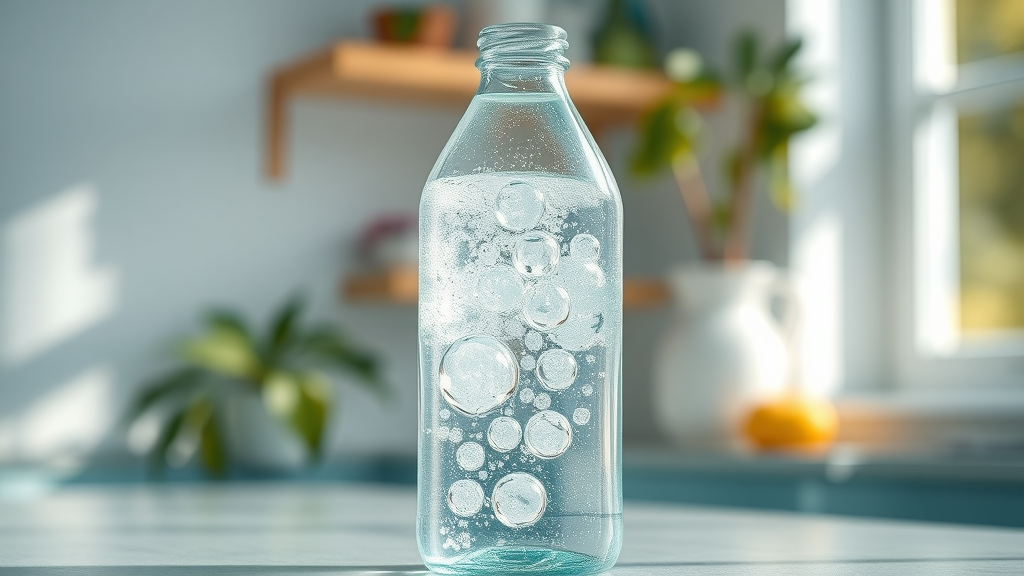
Hydrogen Infusion and Concentration: Core Concepts for Hydrogen Water
The power of hydrogen water comes down to hydrogen infusion and how much dissolved hydrogen (often measured in ppm) remains at the point of drinking. Effective hydrogen infusion is a combination of high-pressure hydrogen production inside your water bottle and the material’s ability to retain these light gas molecules until you hydrate. Glass hydrogen water bottles are often praised for their superior hydrogen retention, as glass is a non-porous and inert material, minimizing hydrogen loss and chemical contamination. In contrast, plastic can sometimes allow gases to escape through tiny micro-pores or interact with the dissolved hydrogen, reducing the water’s efficacy.
It’s also vital to understand that the hydrogen concentration you consume depends on infusion technology and how the bottle holds up over repeated use. Some hydrogen bottles boast built-in generators for continuous hydrogen production, maximizing antioxidant levels. However, if your bottle material degrades, leaches chemicals, or is not designed for effective hydrogen sealing, even the best hydrogen infusion systems can’t deliver optimal results. Ensuring your hydrogen water bottle is built to retain the highest hydrogen levels becomes essential for any user aiming for true functional hydration.
“Hydrogen-infused water bottles are changing the way we hydrate—offering potential antioxidant benefits through enhanced hydrogen concentrations.”
Exploring the Main Types: Glass Hydrogen Water Bottle vs Plastic Bottles
Glass Hydrogen Water Bottles: Innovation, Functionality, and Longevity
Glass hydrogen water bottles have become synonymous with purity and innovation for a reason. Crafted from high-quality borosilicate or specialty glass, these bottles offer a neutral, non-reactive environment for hydrogen water—ensuring that no flavors, chemicals, or odors leach into your drink. Glass is resistant to staining, temperature swings, and is less likely to carry over residues from previous uses, making it a prime choice for those who demand the cleanest water experience possible. Unlike plastic, glass hydrogen water bottles maintain their clarity and surface integrity even after repeated hydrogen infusion cycles. The durability and sleekness of a robust glass bottle also appeal to health-focused individuals who appreciate both safety and style on their desk or at home.
Another key benefit lies in the precision engineering of most glass hydrogen water bottles. Many of these bottles feature stainless steel accents, airtight seals, and advanced hydrogen infusion technology. By ensuring that molecular hydrogen remains dissolved within the water for longer periods, these designs seek to optimize both the immediate taste and the long-term health benefits. While the primary drawback is that glass is heavier and may be more fragile if dropped, its functional superiority for hydrogen retention and longevity often outweighs concerns about portability for many regular users.
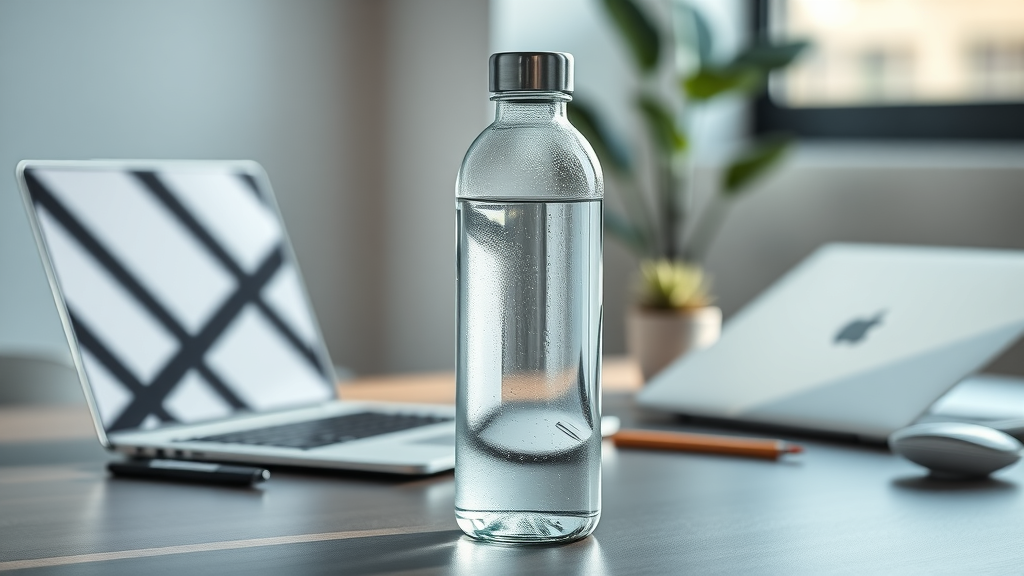
Plastic Hydrogen Water Bottles: Portability, Durability, and Affordability
Plastic hydrogen water bottles appeal to many people due to their lightweight, shatter-resistant nature, and typically lower cost. These bottles are ideal for those with an active lifestyle—carrying their water bottles to the gym, hiking trails, or as part of a daily commute. Modern plastic hydrogen water bottles are most often made of high-grade, BPA-free plastics designed to minimize chemical leaching and resist the corrosion that can come with repeated hydrogen generation and cleanings. Because plastic is flexible and less prone to breakage than glass, these bottles offer a practical option for children, travelers, or anyone prone to accidents.
However, convenience sometimes comes with tradeoffs. Plastic hydrogen water bottles, especially those manufactured from lower-quality materials, can be prone to developing scratches, internal pitting, or retaining odors and stains—particularly after repeated exposure to hydrogen infusion processes. Over time, the micro-pores in certain plastics may allow hydrogen gas to escape from the water, reducing the effective hydrogen concentration and potentially lessening the desired potential health benefits people seek from hydrogen water. Still, not all plastics are created equal, and some high-end plastic bottles make credible efforts to overcome these performance challenges.
Glass Hydrogen Water Bottle: Safety, Purity, and Experience
Glass Material Properties for Hydrogen Water
Glass has long been celebrated as one of the most inert and safest materials for beverage storage. In the world of hydrogen water, the glass hydrogen water bottle truly shines. Glass is non-porous, meaning it doesn’t absorb or leach any compounds from the water—critical when maintaining the purity and intended taste of hydrogen-infused water. Designed for high-pressure environments necessary for effective hydrogen infusion, many glass hydrogen bottles handle the rigors of daily use without degrading or reacting with the hydrogen gas. Unlike some plastics, glass ensures a pure water experience, free from unwanted flavors or the risk of microplastic contamination.
The structural integrity of glass also contributes to user safety. Its resistance to chemical breakdown under stress, heat, or high-pressure hydrogen infusion cycles makes glass a stable choice. While fragility is a common concern, many manufacturers produce reinforced borosilicate glass hydrogen water bottles that balance longevity with user-friendly weight and grip. For the health-conscious, the degree of safety and long-term inertness of glass make it a reliable companion on the path to optimized hydration.
Hydrogen Retention and Infusion in Glass Bottles
One of the standout reasons many experts recommend glass hydrogen water bottles over plastic is superior hydrogen retention. Because glass forms a tight, impervious barrier, it prevents fast dissipation of dissolved hydrogen gas—helping the water maintain high hydrogen concentrations long after production. This is particularly important for those who value the potential health benefits of hydrogen water and want to consume it at peak potency.
Additionally, glass is a preferred medium for advanced hydrogen infusion technologies due to its resilience under repeated high-pressure cycles. Unlike plastic containers that may warp or degrade under stress, a glass hydrogen water bottle holds up to intense use and cleaning. The result is consistent performance, confirmed by laboratory testing that frequently illustrates glass’s superiority over competing bottle materials in hydrogen retention and purity.
Are Glass Hydrogen Water Bottles Better for Health?
The consensus among researchers and hydration specialists is that glass hydrogen water bottles are more likely to deliver a health-focused hydration experience. Because they are free from additives, dyes, and potential hormone-disrupting chemicals found in certain plastics, glass bottles minimize the risk of chemical contamination. The inert nature of glass also ensures the water you’re drinking stays fresh and unaltered, preserving both taste and potential wellness benefits of molecular hydrogen.
For those with allergies or sensitivities, or who value clean living, a glass hydrogen water bottle provides peace of mind with each sip. Backed by both modern research and decades of trusted use, glass is widely regarded as the gold standard in safe, healthy hydration—making it a wise choice for discerning hydrogen water users everywhere.
“Laboratory studies show that glass minimizes contamination and preserves hydrogen concentration longer than some competing materials.”
Plastic Hydrogen Water Bottles: Weighing the Benefits and Drawbacks
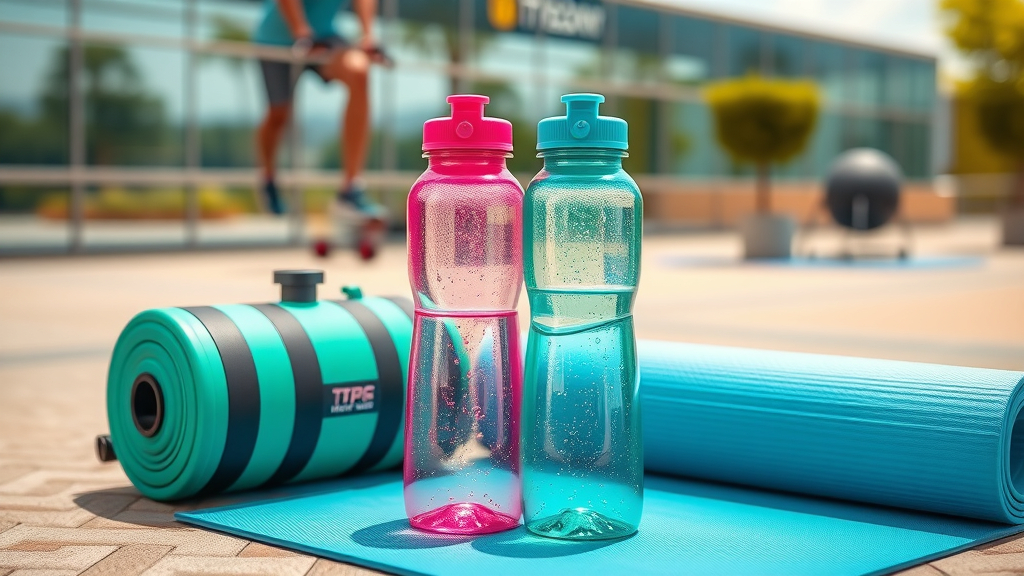
Types of Plastic Used in Hydrogen Water Bottles
Not all plastic hydrogen water bottles are created equal. Manufacturers commonly use materials like PET (polyethylene terephthalate), Tritan, or polypropylene to reduce the risk of chemical leaching and withstand repeated hydrogen infusion. BPA-free plastics are often touted as safer options, but even these can sometimes break down after extended use or repeated washing, potentially allowing microplastics or chemicals to migrate into your drinking water.
Advances in plastic technology aim to address these concerns, with some premium hydrogen bottle brands offering specialized coatings or barrier layers to minimize hydrogen escape and block unwanted chemicals from entering the water. However, even the best plastic hydrogen water bottles face limitations: scratches, sunlight exposure, and repeated high-pressure cycles may still compromise the long-term integrity of the material. That’s why, while plastic bottles offer obvious benefits for portability and affordability, they sometimes come up short in the safety and purity stakes compared to glass.
Hydrogen Bottle Safety Concerns: Chemicals and Leaching
The greatest concern with plastic hydrogen water bottles is the risk—however small—of chemical migration or leaching. While most high-quality brands rigorously test their bottles, plastics naturally degrade over time, particularly after repeated exposure to heat, UV light, or cleaning chemicals. This can result in the transfer of trace amounts of unwanted substances into your hydrogen water—potentially changing its taste and, some experts warn, its health profile. Unlike glass, which remains inert indefinitely, plastic may introduce phthalates, bisphenols, or other compounds, even if they are present only in trace amounts.
Consumers are urged to follow manufacturer guidelines for replacing plastic bottles, avoiding direct sunlight, and never heating or microwaving hydrogen water bottles unless explicitly approved. For long-term, daily hydrogen water fans seeking the highest purity—especially those with sensitivities or compromised immune systems—switching to a glass hydrogen water bottle may be the wiser choice for minimizing exposure to these risks.
Hydrogen Concentration Challenges in Plastic Water Bottles
Dissolved hydrogen is an exceptionally small, mobile molecule, making it a challenge to keep it within your plastic bottle for extended periods. Lower-end plastics, or damaged and aging bottles, are often less effective at maintaining the high hydrogen concentration levels necessary for optimal antioxidant benefits. As a result, those who choose plastic hydrogen water bottles should aim to drink the infused water very soon after it is produced—otherwise the potential health effects could be diminished by lower hydrogen levels.
While some plastics and design improvements can mitigate this issue, it remains a distinct disadvantage compared to glass. For those intent on getting the most out of every sip, seeking out bottles with reputable high-pressure seals and strong, multi-layered plastic construction is essential—though not always a perfect replacement for glass’s naturally hydrogen-retentive qualities.
Comparing Performance: Hydrogen Concentration, Taste, and Longevity
Glass vs Plastic Hydrogen Water Bottles Performance Table | ||
Factor | Glass Hydrogen Water Bottle | Plastic Hydrogen Water Bottle |
|---|---|---|
Hydrogen Retention | Excellent – Maintains high hydrogen concentration for longer periods due to non-porous nature | Variable – May lose hydrogen quickly if (material/quality) is not optimal |
Taste | Pure, clean, unaffected by bottle material | Can develop off-flavors, especially with repeated use |
Chemical Leaching | Extremely low risk | Low to moderate risk, depending on plastic quality and age |
Lifetime | High – Durable, long-lasting with proper care | Moderate – More susceptible to scratches, odors, and need for replacement |
Cost | Typically higher upfront | Usually lower upfront, long-term replacement can add up |
Beyond Glass or Plastic: The Stainless Steel Hydrogen Water Bottle Discussion
Stainless Steel vs Glass vs Plastic Hydrogen Water Bottles
For those seeking an even more rugged option, stainless steel hydrogen water bottles have been gaining traction. Stainless steel balances toughness with chemical resistance and is often chosen for its ability to withstand rough handling while protecting water quality. Unlike glass and most plastics, stainless steel neither absorbs nor imparts flavors. However, it is crucial to note that not all hydrogen infusion technologies are compatible with metallic interiors, and some users feel stainless steel may subtly alter the taste—particularly when hot or carbonated hydrogen water is involved.
Performance-wise, stainless steel comes closer to glass than plastic regarding hydrogen retention and minimizing leaching risks. However, its weight, cost, and lack of transparency (for visualizing hydrogen bubbles) may deter some. When it comes to the ideal blend of safety, functionality, and user preference, the glass vs plastic hydrogen water bottle debate is now increasingly joined by pro-stainless steel advocates looking for durability above all.
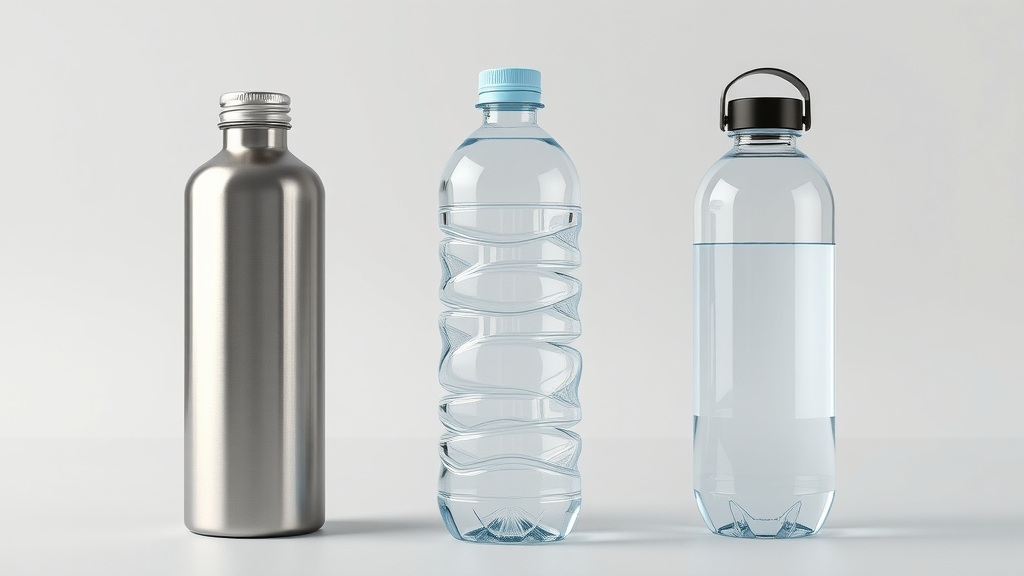
Why Some Users Choose Stainless Steel for Their Hydrogen Water Bottle?
Stainless steel’s chief appeal lies in its virtually indestructible nature and its ability to keep water colder for longer—thanks to superior insulation properties. Many on-the-go professionals, athletes, and outdoor enthusiasts prefer stainless steel hydrogen water bottles for this reason. Additionally, stainless steel is recyclable and generally more sustainable than single-use plastics. That said, consumers must verify the compatibility of their preferred hydrogen infusion device with stainless steel, as not all setups function optimally with metallic bottles.
Those prioritizing ultimate safety may lean toward glass, but for handiness and long-term resilience, stainless steel offers an attractive alternative to both traditional glass and advanced plastics.
Environmental Impact: Glass vs Plastic Hydrogen Water Bottle Sustainability
Eco-Friendliness of Glass Hydrogen Water Bottles
From an environmental perspective, a glass hydrogen water bottle offers real sustainability advantages. Glass is completely recyclable and can be reused almost indefinitely without loss of quality or safety. Unlike plastic, glass does not degrade into microplastics—small fragments now seen as a significant environmental pollutant. Furthermore, the average lifespan of a glass hydrogen water bottle is far greater than most plastics, reducing waste over time. Glass production is resource-intensive, but with robust recycling programs in place, its net environmental impact is generally lower than disposable or single-use plastic bottles, making it an eco-conscious choice for those concerned about planetary health.
Many consumers now choose their water bottle not just for personal benefits but as a reflection of their environmental values. By investing in high-quality, long-lasting glass hydrogen water bottles, users can decrease landfill buildup, conserve resources, and take a simple yet powerful step toward reducing plastic waste and microplastic pollution.
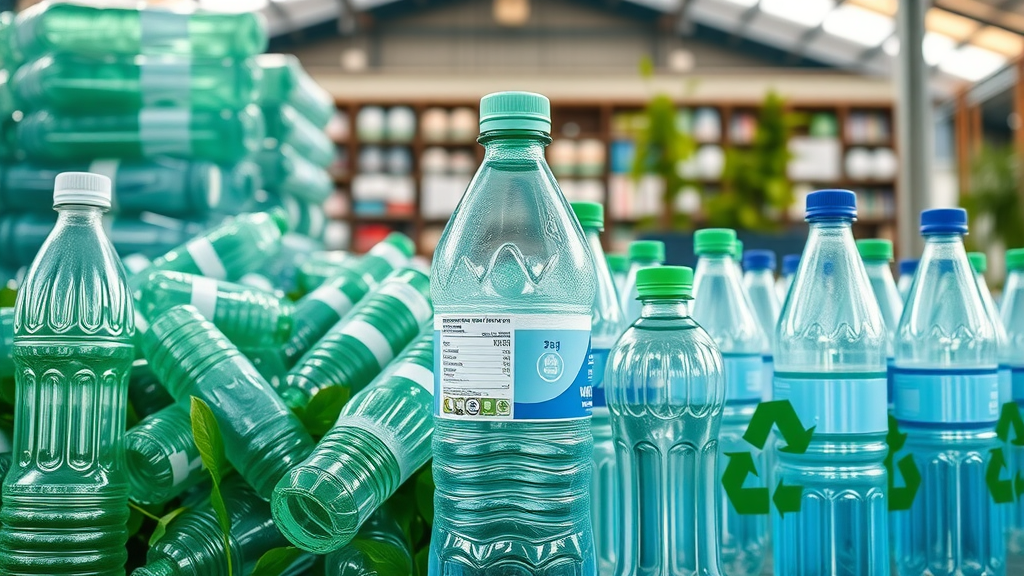
Recycling and Longevity Considerations for Plastic Water Bottles
Plastic hydrogen water bottles, while typically more affordable, face scrutiny for their environmental impacts. Most plastic bottles are recyclable, but a significant proportion never make it into recycling streams, instead contributing to litter and landfill. Over time, plastic degrades—breaking into smaller shards that eventually become microplastics, contaminating waterways and posing risks to wildlife and human health. Although some premium plastic water bottles are built to last longer and reduce replacement frequency, most are designed for limited use and may need to be thrown out after visible wear, odor retention, or performance decline.
To address these concerns, consumers are urged to prioritize plastics labeled as reusable, recyclable, and BPA-free—ideally from companies with strong environmental commitments. However, even the best plastic bottles ultimately don’t match glass’s near-infinite recyclability or the peace of mind offered by a bottle that won’t degrade into microplastics. Longevity, safety, and eco-friendliness are all important considerations when weighing glass vs plastic hydrogen water bottle options.
Glass: Recyclable, reusable, less prone to degradation
Plastic: Lightweight, but often single use and may contribute to microplastics
People Also Ask: Glass vs Plastic Hydrogen Water Bottle Questions
Which is better, a glass bottle or a plastic bottle?
When comparing a glass bottle versus a plastic bottle for hydrogen water, glass usually comes out on top. Glass is inert, non-porous, and exceptional at retaining hydrogen, preserving water taste, and minimizing chemical or microplastic contamination. While plastic bottles offer better portability and a lower cost, they generally face faster degradation and carry a higher risk of leaching chemicals over time. For those prioritizing health, taste, and sustained hydrogen concentrations in their drinking water, a glass hydrogen water bottle is the recommended choice.
Do glass hydrogen water bottles work?
Absolutely. A well-made glass hydrogen water bottle is highly effective at both generating and retaining dissolved hydrogen in your drinking water. Due to glass’s impermeability and stability under pressure, these bottles are designed to maximize hydrogen infusion and minimize rapid hydrogen loss, especially compared to many plastic alternatives. If you use a hydrogen water bottle regularly and want to benefit from consistent hydrogen levels, investing in a quality glass hydrogen water bottle is a sound decision.
What is the healthiest material for a water bottle?
The healthiest material for a water bottle—especially for hydrogen water—is generally glass. Glass doesn’t react with water, doesn’t leach chemicals, and is easy to clean, making it the safest material for both regular and hydrogen-infused water. Stainless steel is a close runner-up, but some users prefer glass to avoid any possibility of metallic taste or interaction. High-quality BPA-free plastic is acceptable for occasional use, but glass remains the gold standard for purity and safety.
Are glass bottles healthier than plastic bottles?
In most respects, glass bottles are healthier than plastic bottles, especially for ongoing use. Glass is non-porous, contains no additives, and resists microbial growth, unlike some plastics that can harbor bacteria or leach undesirable chemicals over time. For health, purity, and taste—especially when using a hydrogen water bottle—glass is preferable by experts, researchers, and wellness enthusiasts alike.
Expert Insights and User Experiences on Glass vs Plastic Hydrogen Water Bottles
“Switching to a glass hydrogen water bottle changed the taste and perception of my daily hydration ritual.” – Long-time hydrogen water user
Safety: Favor glass for minimizing contamination
Practicality: Some prefer plastic for travel
Performance: Glass typically leads for hydrogen concentration retention
FAQs: Answering Your Top Glass vs Plastic Hydrogen Water Bottle Concerns
Can I use any type of water in a hydrogen water bottle?
Most hydrogen water bottles work best with filtered or purified water, free of chlorine or heavy minerals, to ensure optimal hydrogen infusion and prevent wear on the device.How do I clean a glass hydrogen water bottle properly?
Use warm water and mild soap for regular cleaning. For deeper cleans, a mix of vinegar and water or bottle brush helps keep glass spotless. Avoid dropping or overtightening.Is plastic ever safe for hydrogen infusion over time?
Premium BPA-free plastics can be safe for occasional or short-term use, but prolonged exposure, scratches, and frequent washing can increase leaching risk. Glass remains safer for long-term use.
Key Takeaways from the Glass vs Plastic Hydrogen Water Bottle Debate
Glass hydrogen water bottles rank high for purity, safety, and hydrogen retention.
Plastic offers convenience but may compromise hydrogen concentration and health.
Stainless steel is also an option, but glass remains the most inert material.
Making the Right Choice: My Final Recommendations on Glass vs Plastic Hydrogen Water Bottles
Ultimately, if you value your health, the quality of your hydrogen water, and your impact on the planet, my opinion is clear: choose a glass hydrogen water bottle whenever possible for regular use. Go plastic only for specific, short-term needs—or opt for stainless steel if durability is your number-one concern. Prioritize high-quality construction, authentic hydrogen infusion technology, and bottles that fit naturally into your lifestyle.
Ready for a Healthier Sip? Shop the Top Glass Hydrogen Water Bottles Today
Whether you’re starting your hydration journey or upgrading your daily ritual, quality glass hydrogen water bottles are a smart investment in your wellness and the environment. Explore verified, lab-tested models to maximize purity and performance—your body and the planet will thank you!
Conclusion
Choosing the right hydrogen water bottle matters—glass stands out for purity, safety, and longevity.
Sources
When evaluating the safety and effectiveness of glass versus plastic hydrogen water bottles, it’s essential to consider factors such as material durability, chemical safety, and hydrogen retention capabilities.
Durability and Pressure Resistance
Glass bottles, while offering purity and non-reactivity, often struggle to withstand the high pressures required for effective hydrogen infusion. This limitation can lead to lower hydrogen concentrations and potential safety risks due to structural fragility. In contrast, high-quality BPA-free plastics are engineered to handle these pressures, ensuring higher hydrogen concentrations and enhanced durability for daily use. (evolvedh2o.com)
Chemical Safety
Concerns about chemical leaching are prevalent with plastic bottles, especially those containing BPA and other bisphenol compounds. However, advancements have led to the development of BPA-free plastics like Tritan™, which are free from harmful chemicals and do not leach substances into the water, even under extreme conditions. This makes them a safer alternative to traditional plastics. (besth20ever.com)
Hydrogen Retention
The ability to maintain dissolved hydrogen is crucial for the efficacy of hydrogen water. While glass is non-porous and can retain hydrogen effectively, its inability to withstand high pressures can result in lower hydrogen concentrations. On the other hand, specially designed BPA-free plastic bottles can reduce hydrogen loss by preventing excessive gas permeability, thereby maintaining higher hydrogen levels. (besth20ever.com)
Environmental Considerations
From an environmental perspective, glass is 100% recyclable and can be reused indefinitely without losing quality. However, its heavier weight increases transportation emissions. Modern BPA-free plastics are also recyclable and, due to their lighter weight, have a lower carbon footprint during transportation. Nonetheless, plastic production involves petroleum-based resources, which have their own environmental implications. (mayuwater.com)
Conclusion
Both glass and BPA-free plastic hydrogen water bottles have their advantages and drawbacks. Glass offers chemical purity and environmental benefits but may lack the durability and pressure resistance required for optimal hydrogen infusion. BPA-free plastics provide durability and effective hydrogen retention but come with environmental considerations. Ultimately, the choice depends on individual priorities regarding safety, performance, and environmental impact.


